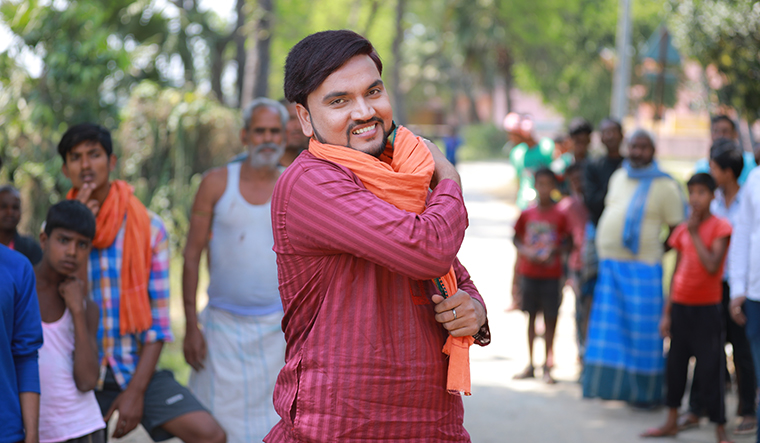The Bhojpuri music industry has a song for every occasion. On March 29, four days after the country went into a lockdown to fight the Covid-19 pandemic, the song ‘Lockdown bhail, ghare kaise aayi (How do I come home during the lockdown)’ was released on Yashi Music—a YouTube channel with 2.55 million subscribers. The song (by Ganesh Singh) takes the form of a conversation between a man and his wife—the latter insisting that he return home. By the end of the song, the man has little success convincing his wife, but the song is steadily climbing the popularity charts.
This is not the first (or last) Bhojpuri song on the pandemic.
On March 21, a day before the Janata Curfew, singer Khushboo Uttam released a song, ‘Janata Curfew ko safal banayenge hum (We shall make the Janata Curfew a success)’. It was her second Covid-19-centric song. Her first song, with husband and collaborator Pravin Uttam, was titled, ‘Hello, kaun coronavirus (Hello, who coronavirus?)’. The song is a conversation between a man who has just returned from China and his hesitant girlfriend, who is unwilling to meet him.
Khushboo says that such songs come naturally to her. “As soon as we heard reports of the virus spreading in Wuhan, we did a bit of internet research and came out with this song,” she says.
To most outsiders, the Bhojpuri film and music industry is somewhat a bawdy entity—for its suggestive movie titles and lyrics, and salacious picturisation of songs. Khushboo says that some people in the industry are responsible for its bad reputation. “My songs on the coronavirus are meant to educate and inform,” she says. “And, then, there comes along a song like ‘Humra lehnge mein coronavirus ghus gayel ba (The coronavirus has entered my skirt)’ which is a shameful parody of this grave situation.”
There is a vast audience for entertainment content in Bhojpuri. Kumar Saurav Sinha, the digital media and content head of Yashi Films Private Limited, says: “As an industry, we are very savvy about internet key words, and have a pulse on what is likely to go viral. Singers send their songs to our channel which releases them without a fee, or we tell them what is likely to click in a given situation.”
Kumar is quick to point out that all music made by the industry is currently being recorded in home studios. “A basic home studio comes for about Rs1 lakh—where there is no limit to how much you can invest in one”, he explains.
People from the industry say that for quite some time now, songs with news value released on digital platforms have been the ideal launching pad for most aspiring singers. Most of these platforms offer free release of content, and then move to a contractual or profit-sharing model once the artist becomes popular. Most of the songs that focus on news-related issues are recorded on pre-existing music tracks—mostly folk tunes. Writing lyrics is often done in a matter of minutes, while basic videos are shot on mobile phones.
Bhojpuri actor and BJP MP Ravi Kishan says: “Bhojpuri speakers have migrated to all parts of the world. They have served in the [Indian] Army, as teachers, as doctors—you name it. A sense of awareness and responsibility comes naturally to them. Thus, the industry is quick to react to any news-related developments.” This quick reaction often translates into big hits with swift popularity in eastern Uttar Pradesh and Bihar—the originating points for most such music.
Gunjan Singh’s controversial song on abrogation of Article 370, ‘Le leybe Jammu Kashmir mein zameen (Shall I buy land in Jammu Kashmir)’, has thus far garnered 3.3 million views. “Everybody watches the news,” he says. “Music is a very effective way of reaching out to people and shaping views.”
Music as a medium to address current affairs escapes the censure that a commentary can invite. Actor and singer Khesari Lal Yadav, for instance, opened himself to much criticism when he commented that tennis player Sania Mirza had lowered India’s reputation by marrying a Pakistani. In contrast, the song he had earlier released on the same issue, ‘Tennis wali Sania dulha khojali Pakistani (The tennis player Sania finds a Pakistani groom)’, was a hit with over 29 million views.
“I have since then stayed off current topics,” says Khesari. “You never know what opinion you might encounter. The mass production of music on current issues and the ease with which it can be released has meant a fall in quality.”
Alok Kumar Singh, the producer of hit Bhojpuri films like Sajan Chale Sasural (1996), says: “Quick [release of content] is not always good. The censor board must be more vigilant. While the industry might be educating people, it needs to consciously work on improving standards”.
But for now, the music continues to play on.




